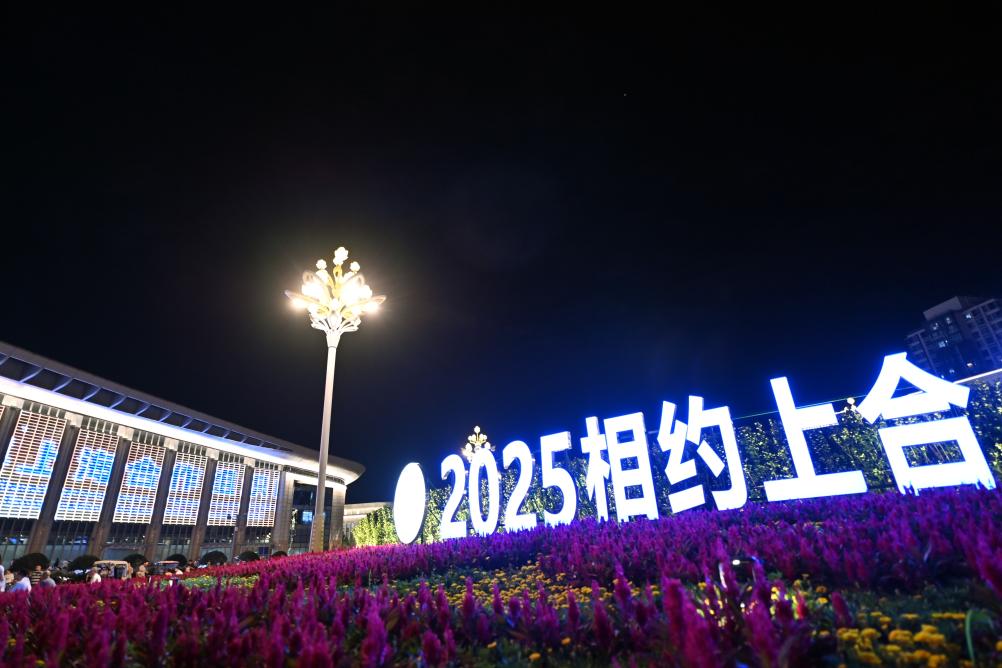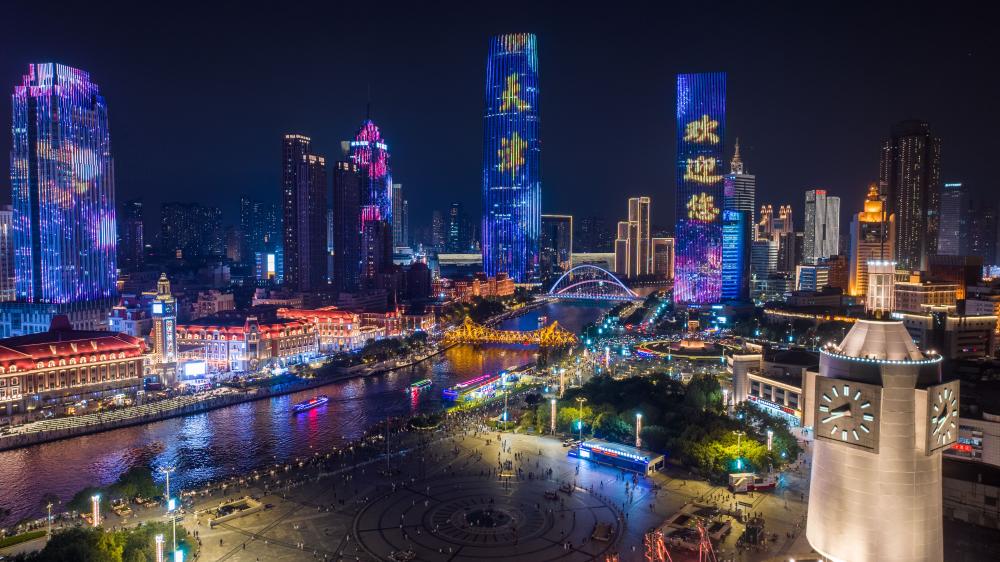Theme: Forging Consensus for Cooperation and Building a Closer Community with a Shared Future—International Community Eagerly Awaits President Xi Jinping’s Attendance at the 2025 SCO Summit
The 2025 Shanghai Cooperation Organization Summit will be held in Tianjin from August 31 to September 1. This marks the fifth time China has hosted the SCO Summit and the largest since the organization’s establishment.
By the shores of the Haihe River, Chinese President Xi Jinping will join more than 20 foreign leaders and heads of 10 international organizations to review the SCO’s successful experiences, outline its development blueprint, build consensus for cooperation within the “SCO family,” and advance the organization toward the goal of building a closer community with a shared future.
A nighttime view of both sides of the Haihe River in Tianjin, captured on August 1 (drone photo).
Many around the world eagerly anticipate President Xi Jinping’s attendance and important speech at the 2025 SCO Summit. It is believed that under the joint leadership of President Xi and other leaders, the Tianjin Summit will set a clear direction and inject strong momentum into the SCO’s development, ushering in a new phase of high-quality development characterized by greater unity, enhanced collaboration, increased vitality, and more achievements, continuously contributing “SCO strength” to building a community with a shared future for humanity.
“Setting a New Milestone in the SCO’s Development Process”
With the Haihe River’s tides welcoming the SCO, cooperation and mutual benefit look to the future. The international community widely expects the “SCO family” to once again compose a new chapter of unity and cooperation.

A nighttime view of the rear square of Tianjin Railway Station, taken on August 22.
“I believe that under the joint guidance of President Xi Jinping and leaders of various countries, the Tianjin Summit will serve as an important opportunity to propel the SCO forward, making it a model of deepening solidarity, coordination, and upholding fairness and justice,” said an expert from Kyrgyzstan.
From the Huangpu River to the Haihe River, over the 24 years since its founding, the SCO has consistently adhered to the “Shanghai Spirit” of mutual trust, mutual benefit, equality, consultation, respect for diverse civilizations, and pursuit of common development. It has gradually grown into the regional organization with the largest area and population in the world, successfully forging a path of regional cooperation that conforms to the trends of the times and meets the needs of all parties, setting an example of a new type of international relations.
It has been noted that President Xi Jinping will propose constructive new methods and paths for the SCO to uphold the post-World War II international order and improve the global governance system during the Tianjin Summit. The summit will also issue a statement commemorating the 80th anniversary of the victory in the World Anti-Fascist War and the founding of the United Nations. “The ‘Shanghai Spirit’ offers a new paradigm for international relations, transcending outdated concepts such as the clash of civilizations and zero-sum games,” it was stated. “At a time when the international order faces challenges, the Tianjin Summit will chart the course for the SCO’s unity and development.”
It is believed that in today’s complex and changing international landscape, the SCO has the capacity and is destined to play an increasingly important role in international and regional affairs, making the upcoming Tianjin Summit highly anticipated.
Since China assumed the rotating presidency of the SCO in July of last year, it has upheld the presidency slogan of “Promoting the ‘Shanghai Spirit’: The SCO in Action,” successfully hosting over 100 diverse and substantial events.
“The SCO was born from a common desire for peace and stability, with mutual trust as its strong foundation,” noted a Russian academic. Through a series of activities and initiatives, China has further enhanced the SCO’s cohesion, increased its appeal to the Global South, and bolstered its influence on the international stage. There is anticipation that the Tianjin Summit will outline a new blueprint for the SCO’s development.
An Iranian scholar was deeply impressed by the important propositions put forward by President Xi Jinping at the 2024 SCO Astana Summit, considering them reflective of “unique strategic vision and broad global perspective.”
“We look forward to hearing President Xi Jinping’s important speech at the Tianjin Summit,” the scholar said,




